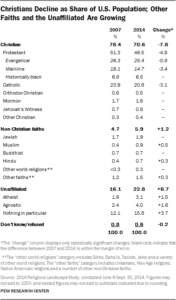A Look at Religion's Afterlife
Someone asked the following question:
"When a Christian dies, people say, 'They are with Jesus now.' So do any other religions believe the same way? If so, who are they with and where?"This provided me an opportunity to write a post on the subject.
The Landscape
According to some estimates, there are 4200 religions in the world. Most are familiar with the following; Hinduism, Buddism, Paganism, Wicca, Atheism, Christianity, Islam, and Judaism. The complexity is when these religions defrag into many other divisions within.

Living in America, we see the religious landscape changing over time. the major new survey of more than 35,000 Americans by the Pew Research Center finds that the percentage of adults (ages 18 and older) who describe themselves as Christians has dropped by nearly eight percentage points in just seven years, from 78.4% in an equally massive Pew Research survey in 2007 to 70.6% in 2014. Over the same period, the percentage of Americans who are religiously unaffiliated – describing themselves as atheist, agnostic or “nothing in particular” – has jumped more than six points, from 16.1% to 22.8%. And the share of Americans who identify with non-Christian faiths also has inched up, rising 1.2 percentage points, from 4.7% in 2007 to 5.9% in 2014. Growth has been especially great among Muslims and Hindus, albeit from a very low base. (Source)
There are too many religions and branches within each to cover for the purpose of this article. However, we will look at the more known religions and their belief of an afterlife. This will be a simple view of each.
Afterlife
Christianity:
While there are many divisions within this group, the main staple is a heaven for those doing good and a hell for those who are wicked.
Buddhism:
They believe or accept basic Hindu doctrines of reincarnation and karma. Their goal is to escape the cycle of death and rebirth.
Judaism:
The belief that the souls of the righteous dead go to a place similar to the Christian heaven, or that they are reincarnated through many lifetimes, or that they simply wait until the coming of the messiah, when they will be resurrected.
Islam:
The tenets of the Muslim faith, death is the complete end of physical life and the beginning of a period of rest until the day of resurrection when Allah judges the living and the dead. When the Day of Judgment arrives, everyone is judged according to their deeds in life.
Hinduism:
The Upanishads, the ancient set of Hindu religious texts, postulated an eternal, changeless core of the self called as the "Atman." This soul or "deep self" was viewed as being identical with the unchanging godhead, referred to as Brahma (the unitary ground of being that transcends particular gods and goddesses). Untouched by the variations of time and circumstance, the Atman was nevertheless entrapped in the world of "samsara" (the cycle of death and rebirth). Unlike Western treatments of reincarnation, which tend to make the idea of coming back into body after body seem exotic, desirable, and even romantic, Hinduism, Buddhism, and other southern Asian religions portray the samsaric process as unhappy. Life in this world means suffering.
Spiritualism/Spiritism:
all people and animals that have been loved (had their vibrations raised) such as pets, continue to live after physical death. On crossing over we take three things with us: our etheric or spirit body (a duplicate of our physical body) all memories and our character.
Atheism:
The belief of only our contributions to the world we are departing will live on, and that's all there is to it.
Wicca:
Viewed as an experimental religion, the sacred teachings often say nothing of what happens to you after you die. Many thoughts are derived within the Wicca belief; transmigration of souls, simple reincarnation, division of souls, non-linear reincarnation, familial incarnation, choice, late hellenic, neo-christian, you rot. (Source)
Paganism:
In The Pagan Book of Living and Dying, author Starhawk says, “Imagine if we truly understood that decay is the matrix of fertility… we might view our own aging with less fear and distaste, and greet death with sadness, certainly, but without terror.” Many Pagans believe that there is some sort of afterlife, although that tends to take varying forms, depending on the individual belief system. (Source)
Occultism:
Similar to others, many have differing ideas within the group. Reincarnation is popular, or some form of heaven. Others take on the idea nothing is created or destroyed, rather transforms.
Personal Note:
The trend I am seeing is the blend of many religions into each individual's choice. You see mega churches adopt paganism and occultism to a degree. Recently, I watched a video of a Catholic church bring in "Beyonce" as a source of inspiration.
We see this blending in Science as well, with the ancient occult knowledge. Quantum Physics is being seen as ancient occult knowledge. Interestingly older known scientist have based many of their findings from ancient texts.
My point is the older models of religion and belief systems seem to be breaking and blending.
You can find more content from Matt Cole @ Patreon.